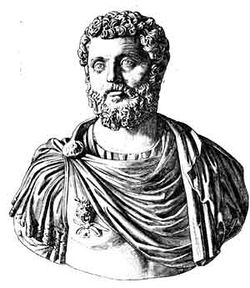Edict of Milan
The Edict of Milan was a proclamation that established religious toleration for Christianity within the Roman Empire. It was the result of a political agreement concluded in Mediolanum (modern Milan) between the Roman emperors Constantine I and Licinius in February 313.
The Edict of Milan gave Christianity in general a sort of legal status. It provided some reprieve from persecution imposed upon Christians in assembly and the Church.[1].

Rome had outlawed private religion:
"Severus returned victorious from having vanquished the kings who had taken part with Nigar against him. He published his cruel edicts against the Christians in the year of Christ 202, the tenth of his reign. But the general laws of the empire against foreign religions, and the former edicts of several emperors against the Christians, were a sufficient warrant to many governors to draw the sword against them before that time; and we find that the persecution was very hot in Africa two years before, under the proconsul Saturninus..." [2]
The edict did not actually establish the "legal status" of the Church established by Christ. Jesus had done that already and Pontius Pilate affirmed that with his proclamation, nailing it to the cross.
It did establish a reprieve from persecution and allowed property to be restored to the existing Church. The long range consequence of this and subsequent edicts along with numerous councils by a new kind of christian would do more harm to the gospel of the kingdom than the persecutions.
What this edict did was make it legal to form private religion again.[3]
Instant Christians
What the Edict of Milan actually did was open the door to thousands of people who would claim to be Christian, elect Nishops to oversee their daily ministration and literally form a distinctly different Church. That new church would appeal to the senate, as we see with Ambrose and to Constantine himself.
Christianity did not become the "state church of the Roman Empire" until AD 380 with the Edict of Thessalonica. By then there were large number of what might be called "instant Christians" who had converted to forms of Christianity designed by Constantine and men like Ambrose. These people formed an alternative to true Christianity that historically paralleled s
a pseudo Christianity that did not conform to the Sound Doctrine of Christ nor heed the warnings of the apostles.
With the exercise of authority, an acceptance of covetous practices and the redefinition of words that institution of Constantine became the forerunner of the Modern Church.
For his version of Christianity under their binding authority. “As guardian of Constantine’s favored religion”, certain churches and bishops were, “given legal rights and large financial donations.”[4]
These new converts to this false religion and their authoritarian bishops were willing to be subsidized by the the authority and power of Caesar. This new institution and its false prophets would change the appearance of "Christianity" to the people of the world distorting the Gospel of the Kingdom.
If you need help:
- Or want to help others:
Join The Living Network of The Companies of Ten
The Living Network |
Join Local group |
About |
Purpose |
Guidelines |
Network Removal
Contact Minister |
Fractal Network |
Audacity of Hope |
Network Links
Footnotes
- ↑ Persecution began with jealousy and envy with the same spirit seen in the modern cancel culture but took on a legal status with the Christian conflict between private religion and public religion.
- ↑ The Lives of the Saints. Volume VII: July. 1866. Rev. Alban Butler (1711–73).
- ↑ "When you see that this has been granted to [Christians] by us, your Worship will know that we have also conceded to other religions the right of open and free observance of their worship for the sake of the peace of our times, that each one may have the free opportunity to worship as he pleases; this regulation is made that we may not seem to detract from any dignity of any religion." — "Edict of Milan", Lactantius, On the Deaths of the Persecutors (De Mortibus Persecutorum), ch. 48. opera, ed. 0. F. Fritzsche, II, p 288 sq. (Bibl Patr. Ecc. Lat. XI).
- ↑ Funk & Wagnalls New Encyclopedia Vol. 7 p.149
Links to other articles
Saved |
Eternal life |
The Blessed Strategy |
The Way |
Whosoever believeth |
Nailing it to His cross |
Worship |
Faith |
Hope |
Charity |
The Peaceful Majority |
Allegiance and Faith |
Unbeliever |
Grace |
Duty |
Keep the Commandments |
Bible |
Salvation |
Sacrifices |
Faithful |
Believer |
Consent |
Judge not |
Divers lusts |
Greed |
Lasciviousness |
Wantonness |
Dry Bones |
Gospel of the Kingdom |
Perfect law of liberty |
Network Purpose |